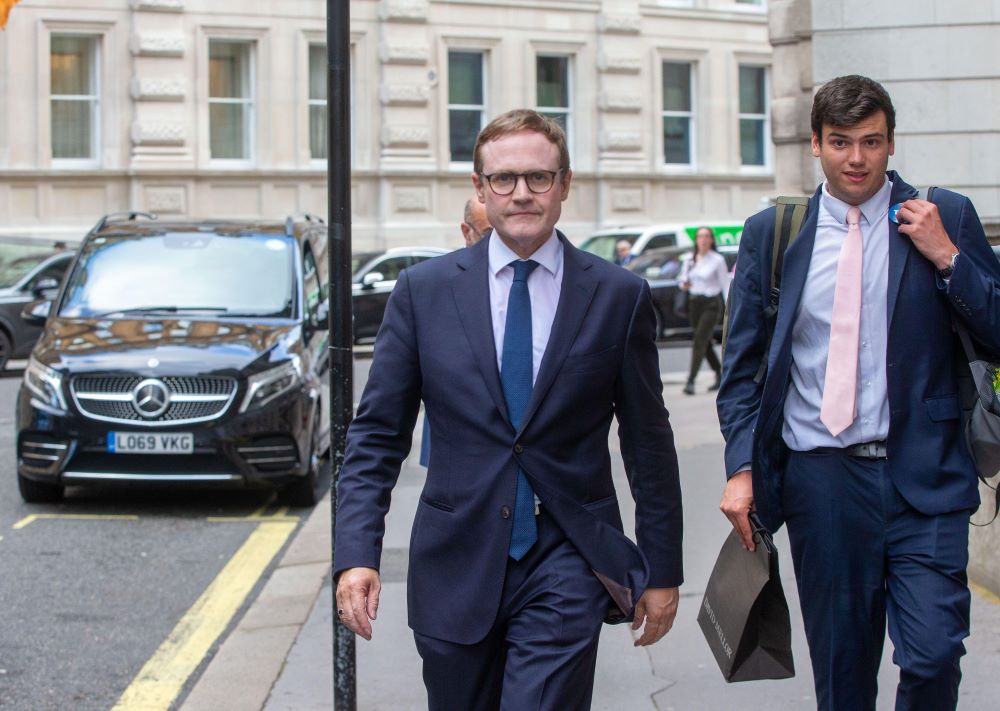Tom Tugendhat Says He Might Need 10 Years As PM To Bring About A "Conservative Revolution"
Tom Tugendhat gave a speech to mark the official launch of his campaign on Tuesday (Alamy)
4 min read
Tory leadership contender Tom Tugendhat admitted that he might need two terms in Downing Street to bring about the "Conservative revolution the country truly needs".
Speaking in central London on Tuesday morning, Tugendhat said it would take more than a "single policy" or "quick fix" to help the Conservatives recover from their heavy defeat to Keir Starmer's Labour at the 4 July General Election.
Tugendhat is one of the six candidates in the running to succeed Rishi Sunak as Leader of the Opposition. The others are Kemi Badenoch, James Cleverly, Robert Jenrick, Priti Patel and Mel Stride.
Widely seen as the most centrist candidate in the leadership race – though not something he himself admitted, referring to himself as the "Conservative" candidate – Tugendhat apologised to voters for the recent political turmoil, saying "the Conservative Party owed you better".
"I witnessed the recent political trauma with a combination of depression and anger," he said.
"I witnessed the failed coups and the successful ones, and I saw duty give way to ego... That's why I'm standing before you today, because this country can change. We must change, and Britain deserves better."
Tugendhat said this was why he was campaigning for a "Conservative revolution".
"This isn't a single policy, it's not a quick fix," he said.
"Sadly, it is going to be four years, but I'm going to need all four years of opposition to make sure that our policies are ready. Because I tell you what, on day one, I'm going to need to start because the leadership we offer will need to begin right at the beginning."
He added that if he wins the next general election as Tory leader, it might take a decade to bring about the sort of change "this country truly needs".
"It's going to take us an entire term of government and maybe two to bring about the Conservative revolution that this country truly needs," he told supporters.
Tugendhat, who was Minister of State for Security, used most of his speech to focus on international threats to UK, citing his military experience and his Jewish ancestry and reasons why he had "fought for years" against "tyrants" on the international stage.
"Let's be clear, the purpose of British foreign policy is to keep the British people safe and prosperous," he said.
"That's it. Nothing more. It's not to play games."
He added that he – alongside other leadership contenders – would want to see 3 per cent of GDP to being spent on defence.

Tugendhat also reiterated his pledge to cap non-British net migration at 100,000 people a year if he was become Conservative leader and later prime minister, as in his view, "to drive change, we do need clear targets".
He added that it would be imperative to "remove" non-British people who commit serious crimes, citing examples from other countries where people with serious criminal convictions have been deported or had their citizenship revoked.
"The British people should never have their rights trumped by the rights of criminals who've come to do them harm," Tugendhat said.
After the speech, PoliticsHome spoke to some of the Conservative candidates who failed to secure a seat in the recent General Election and were in attendance.
Wimbledon candidate Danielle Dunfield-Prayero and Richmond Park candidate Sara Gezdari both lost to the Liberal Democrats in July, and were keen to support a candidate for the Conservative leadership who could "unite" the party.
Dunfield-Prayero told PoliticsHome it was important for the party to remember how many seats were taken by the Lib Dems, rather than solely focusing on winning back voters from Reform UK, particularly around London where she described voters as generally more "centrist".
Gezdari said she felt Tugendhat was best placed to “unite” the party, and that rather than lurching to the "right", the party had to keep the “bigger picture” in mind. She added that having been born under the communist regime in Albania and fled the country as a child during the 1997 civil war, Tugendhat's messaging on the importance of national security and democracy was something which particularly resonated with her.
One Conservative member said they also supported Tugendhat's campaign and said they just wanted the "squabbling to be over".
Another member said they felt that as a young person living in London, they felt Tugendhat represented young people's interests.
One former Conservative MP in attendance said that while it was one of the best speeches he had heard Tugendhat deliver, they thought it was "a bit long in the middle" and felt it could have touched on public services to a greater extent.
Conservative MPs will vote in a preliminary secret ballot, which takes place in rounds to whittle down the initial list of nominees. Once the list is narrowed to two candidates, the vote goes to the membership to then decide between the final two, with the final result announced on 2 November.
